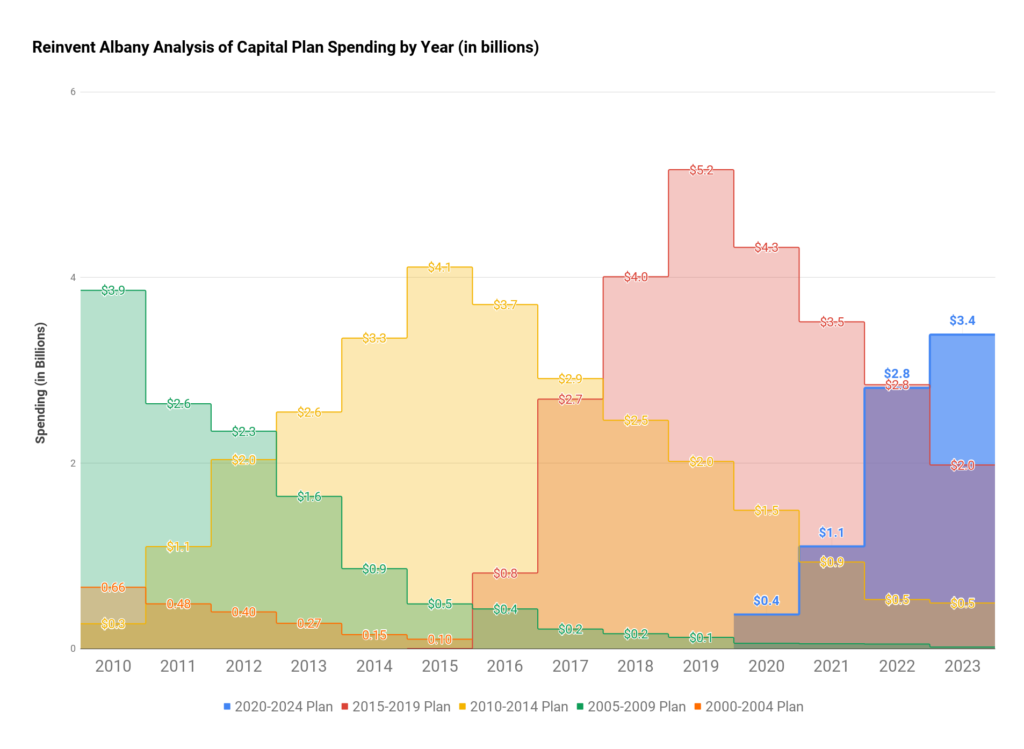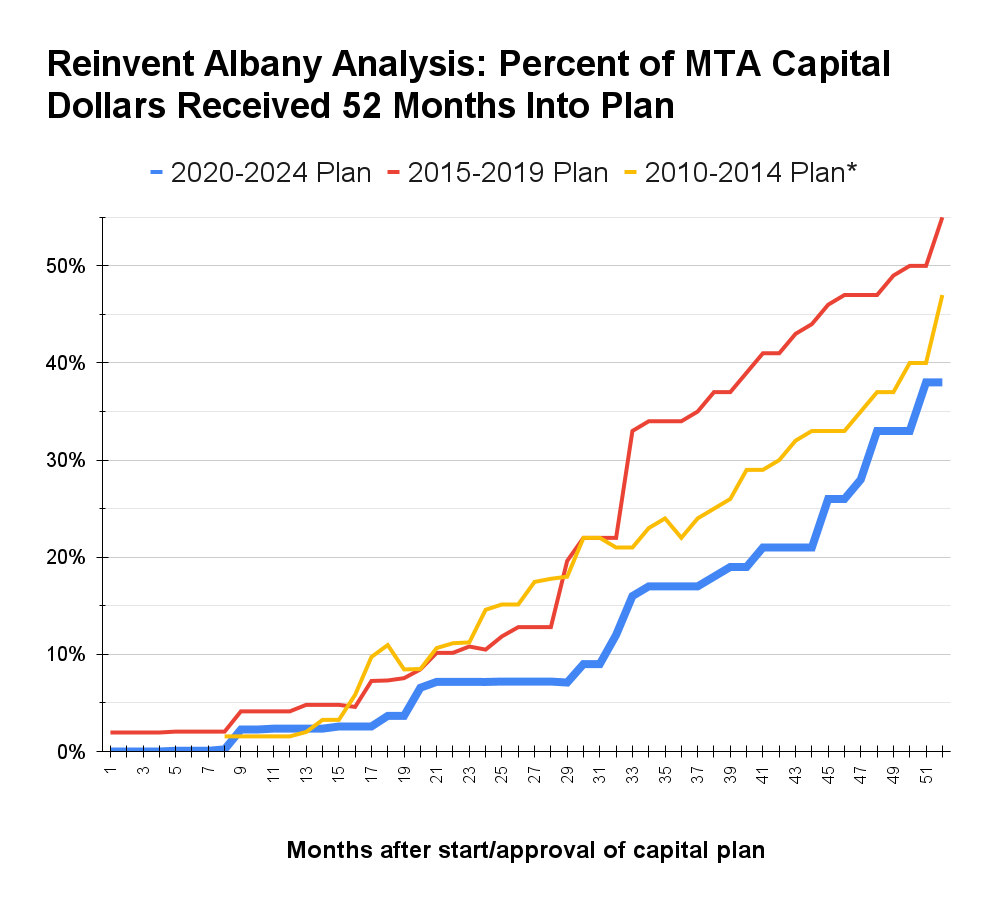FAQs on Hochul’s Daft Plan to Cancel Congestion Pricing
Last updated July 9, 2024
On June 5, Governor Kathy Hochul made a surprise announcement that she had “directed the MTA to indefinitely pause the [congestion pricing] program.” Reinvent Albany urged the legislature to reject her epic blunder, which will blow a $15 billion hole in the MTA’s 2020-2024 capital plan and is a massive betrayal of the public trust. Here are our responses to some of the questions we are getting from the press and public.
We will continue to update this post as more information becomes available.
Reinvent Albany Communications on Hochul’s Congestion Pricing Fiasco
- June 26, 2024 – The MTA Is Big Business in the Tri-State Region
- June 26, 2024 – Testimony: 100,000 NYS Jobs at Stake with Congestion Pricing Cancellation
- June 11, 2024 – Hochul’s Congestion Pricing Cancellation Would Cost MTA Workers $3.2 Billion in Lost Wages
- June 7, 2024 – Senate Must Reject Governor’s Cockamamie IOU Scam, Fails as Substitute for $15 Billion Raised Now by Congestion Pricing
- June 6, 2024 – Legislature Must Reject Epic Hochul Blunder, There is No Plan B That Can Substitute for Congestion Pricing
Other Op-Eds and Communications Worth a Look (see bottom of post)
Frequently Asked Questions
Can the Governor Legally “cancel” congestion pricing?
No. Congestion pricing is required under a 2019 state law. Governors must follow the law. The Legislature would need to vote to change the law or the timelines established by it, otherwise the MTA is required to implement it. New York State’s Vehicle and Traffic Law Sec. 1704.1 requires that the Triborough Bridge & Tunnel Authority (which is corporately the MTA) “shall establish” the program “notwithstanding any law to the contrary,” Sec. 1704.3(a).
Under 553-j of the Public Authorities Law the MTA “shall establish a fund to be known as the central business district tolling capital lockbox fund which shall be kept separate from and shall not be commingled with any other monies of the authority.” The law further requires that the funding be used for the central business district tolling program created by the Vehicle and Traffic Law.
Can the MTA Board cancel or delay congestion pricing?
Yes and No
Yes. Under the law, the MTA Board votes on the specifics of the congestion pricing program, including toll rates and start date. The Board could vote to keep delaying until it becomes moot.
No. Under the Public Authorities Law Under Public Authorities Law Section 2824, the MTA Board members must sign an acknowledgement of fiduciary duty requiring them to “ultimately apply independent judgment in the best interest of the authority, its mission and the public.” See also guidance from the Authorities Budget Office on fiduciary duty. We believe the MTA board would violate its fiduciary duty to the MTA if it voted to reverse its previous votes and suddenly rejects $15 billion in already legally approved capital funds for the 2020-2024 capital plan. We do not see how it is possible for the MTA board to fulfill its fiduciary duty by defunding the MTA. If New York State gives the MTA $15 billion directly or in a form that cannot be raided or reneged on, the Board can more reasonably decide not to proceed with congestion pricing.
Did the MTA Board’s resolution to acknowledge the Governor’s congestion pricing pause also make them responsible/legally culpable for the pause?
No. According to our conversations with a variety of experts and lawyers, the resolution did not legally shift the responsibility of the pause to the MTA or the MTA Board. It was carefully worded to state that that MTA cannot implement the legally-required program until a tolling agreement is signed by the state, and that the agency is authorized to take steps necessary to allow the program to move forward once the state approves the agreement. This means that the Governor is still responsible for the pause and will be the primary target of any forthcoming lawsuits.
Are their ways Governor Hochul can unilaterally delay congestion pricing?
Yes. Unfortunately, it appears the Governor can stall congestion pricing by ordering the State Department of Transportation (DOT) not sign-off on a routine toll agreement with the MTA (in this case, the tolling agreement for the federal Value Pricing Pilot Program). This is like wrecking a big deal by refusing to check one box in a stack of forms.
Is raising the Payroll Mobility Tax (PMT) on NYC a substitute for congestion pricing?
No. The Long Island Rail Road is getting 10% or $1.5 billion, and Metro-North Railroad is also getting $1.5 billion from congestion pricing as part of the 2020-2024 capital plan. It is absurd to ask only NYC employers – who will pass this on to employees – to foot the bill for them. We believe any increase in PMT should include the entire MTA service area, or the MTA should eliminate the 2020-2024 capital funding for the commuter railroads that would have been paid for by congestion pricing.
There is no alternative funding source to congestion pricing that can raise $15 billion for the 2020-2024 capital plan without destroying the viability of the 2025-29 capital plan, gutting state reserve funds, or burdening MTA riders or all state taxpayers with debt. Further raising the PMT on NYC employees would take this revenue source entirely off the table for the 2025-2029 plan, and is already opposed by business groups, like the Partnership for New York City.
Is the MTA already behind on the 2020-2024 capital plan funded by congestion pricing?
Yes, in part because of delays activating congestion pricing, the 2020-2024 capital plan is years late and as their latest financial audit for 2023, the MTA had only spent $7.7 billion of the $55 billion budgeted.
MTA spending and commitments (new contracts signed) are down, and the 2020-2024 is the least well-funded of the last three plans at this stage, more than four-and-a-half years into the five-year plan. See our updated charts below.
Does the 2025-2029 capital plan really start in 2025? Where’s the funding?
Yes. The MTA Board must approve another five-year capital plan by October 1, 2024, for the years 2025-2029.
The Governor is taking a $15 billion source of revenue off the table, meaning that there is a $15 billion hole in the 2020-2024 capital plan. If Albany increases an existing tax, like the Payroll Mobility Tax or new funding source, that will subtract potential funding for the next capital plan, which starts in less than a year. Raising taxes and revenues is politically difficult. For the next capital plan to start on time in 2025, the Legislature and Governor must find and approve large amounts of new funding in the next budget, due by April 1, 2025. How in the world will Albany fund the next capital plan if it defunds the current plan? The MTA needs to spend tens of billions on new subway cars, signals and rails and new buses and commuter trains. The MTA has said it needs $6 billion for resiliency projects alone over the next decade. It simply cannot fund these needs if congestion pricing is cancelled. Their is no Plan B for congestion pricing that pays for the present and does not steal from the future.
Does delaying or canceling congestion pricing hurt companies doing MTA work?
Yes. The MTA paid local businesses in the tri-state area $35 billion from 2013-2024. Congestion pricing’s delay would mean less money for capital projects and all the businesses that support the MTA by providing engineering expertise and building the MTA’s train cars and buses, among other goods and services. Our analysis from June 2024 found that 100,000 jobs are at risk with congestion pricing’s cancellation in NYS alone, and showed that prior MTA spending went to companies in 100% of congressional districts, 100% of state senate districts, and 98% (147 out of 150) assembly districts. Previously, Reinvent Albany published details of the MTA spending $3 billion on companies in New Jersey (June 2023) and $8 billion across the United States (June 2020).
Does canceling or delaying pricing hurt MTA and other union workers?
Yes! Congestion pricing would have paid for MTA workers to do $3.2 billion to do in-house capital projects. Canceling this work means uncertainty for the MTA’s workforce with potential hiring freezes or layoffs. Additionally, of the remainder of the funding spent on outside contractors, many of them have unionized workers.
Has the MTA already spent a lot on congestion pricing?
Yes, at least $500 million according to the Independent Budget Office, probably close to a billion, though. We are still finalizing the numbers.
Other Op-Eds and Communications Worth a Look (more to come)
- June 26, 2024 – New York Times: Canceling Congestion Pricing Could Kill 100,000 New York Jobs
- June 9, 2024 – Daily News Editorial: Congestion pricing countdown: Hochul has no authority to slow down the tolling program
- June 7, 2024 – Senator Liz Krueger’s op-ed in NY Daily News: Killing the MTA’s toll program breaks state law
- June 6, 2024 – Daily News Editorial: Congestion pricing countdown: Hochul’s terrible mistake harms the MTA, traffic safety and the environment
- June 6, 2024 – ABC News 10: No congestion pricing means ripple effects upstate
- June 5, 2024 – Mara Gay’s op-ed in The NY Times: Gov. Hochul’s Unwarranted Retreat on Congestion Pricing
- June 5, 2024 – Newsday Editorial: Hochul wrong to derail Manhattan tolling plan


